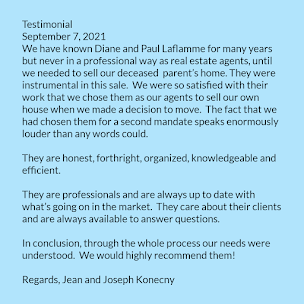Press Release
QFREB
Centris Residentail Sales Statistics
for the Montréal Metropolitain Area
Île-des-Sœurs, April 12, 2013
According
to the real estate brokers’ provincial database, there were 9,927 residential
sales transactions in the Montréal Metropolitan Area in the first quarter of
2013, an 18 per cent decrease compared to the first quarter of 2012, indicated
the Québec Federation of Real Estate Boards.
“We’re
still feeling the effects of the new mortgage rules introduced last summer,”
said Diane Ménard, Vice-President of the GMREB Board of Directors and
spokesperson for the Québec Federation of Real Estate Boards (QFREB) for the
Montréal area. “Since the tightening of the rules, this has been the third
consecutive quarterly decrease in sales in the Montréal area,” she added.
All
property categories and all geographic areas were affected by the sales
slowdown in the first quarter of 2013. The North Shore fared best with an 11 per cent
decrease in sales.
The median
price of single -family homes in the Montréal area increased by 1 per cent to
reach $272,000. The median price of condominiums remained stable at $220,000
and that of plexes grew by 2 per cent, reaching $420,000, compared to the first
quarter of 2012.
The number
of properties for sale increased by 10 per cent in the first quarter of the
year, mainly due to a sharp increase in the supply (25 per cent) of
condominiums.
“Buyers now
have the upper hand on the Montréal condominium market, for the first time in
15 years,” said Paul Cardinal, Manager, Market Analysis, at the Québec
Federation of Real Estate Boards. “In general, sellers of condominiums must now
be more patient as the average selling time reached 108 days in the first
quarter of 2013, 18 more days compared to one year earlier,” he added.
Province’s Real Estate Market Slows
in First Quarter of 2013
According
to the real estate brokers’ provincial database, there were 18,939 residential
sales transactions in the province of Québec in the first quarter of 2013, a 16
per cent decrease compared to the first quarter of 2012, indicated the Québec
Federation of Real Estate Boards (QFREB).
The
decrease in sales was spread across all of the province’s metropolitan areas
and most of
Its smaller
urban centres. Only the agglomerations of Rouyn-Noranda (+25 per cent),
Salaberry-
de-Valleyfield
(+6 per cent) and Shawinigan (+6 per cent) bucked the trend and
posted an increase in sales. In contrast, the agglomerations of Sept-Îles (-36 per
cent), Val-d’Or (-27 per cent) and Drummondville (-28 per cent) registered the
largest decreases in sales.
The median
price of single-family homes across the province stood at $225,000 in the first
quarter of the year, only $1,000 more than in the first quarter of 2012. The
largest price increases for single-
family
homes were in the agglomerations of Val-d’Or (+15 per cent),
Saint-Lin-Laurentides (+8 per cent
),
Saint-Hyacinthe (+8 per cent) and Sept-Îles (+7 per cent). Among the Census
Metropolitan Areas (CMAs), Saguenay registered the largest increase in median price of
single-family homes, at 4 per cent.
As for
condominiums, the provincial median price reached $208,000 in the first quarter
of 2013, up 1 per cent compared to the same period in 2012. The largest price increases
were in the agglomerations of Granby (+13 percent) and Saint-Hyacinthe
(+8per cent), as well as in the Québec City CMA (+7 per cent.
The number
of properties for sale increased for a twelfth consecutive quarter. There were an
average of 70,239 properties listed on the Centris ®system in the first quarter of 2013, a 7 per cent increase
compared to the first quarter of last
year. “The increase in supply and the
decrease in sales resulted in an easing of market conditions in most urban
centres, which translated into smaller price increases and longer average
selling times,” explained Paul Cardinal, Manager of the Market Analysis
Department at the QFREB.
About the Greater Montréal Real
Estate Board
The Greater
Montréal Real Estate Board is a non-profit organization that brings together
close to 11,000 real estate broker members. Its mission is to actively promote
and protect its members' professional and business interests in order for them
to successfully meet their business objectives.
About the Québec Federation of Real
Estate Boards
The Québec
Federation of Real Estate Boards is a non-profit organization composed of
Québec's 12 real estate boards and more than 14,000 real estate brokers who are
members. Its mission is to promote and protect the interests of Québec’s real
estate industry so that the boards and their members can successfully meet
their business objectives.
About Centris®
Centris ® , a division of the Greater Montréal Real Estate Board,
offers technology resources to Québec’s 12 real estate boards and their 14,000
real estate brokers. Centris.ca is
Québec’s real estate industry website for consumers, grouping all properties
for sale by a real estate broker under the same address.
http://www.fciq.ca/pdf/Communiques_presse/q1_2013_mtl_a.pdf
http://extranet.centris.ca/MONTREAL/Upload/STATSCENTRIS_MARCH2013.pdf






